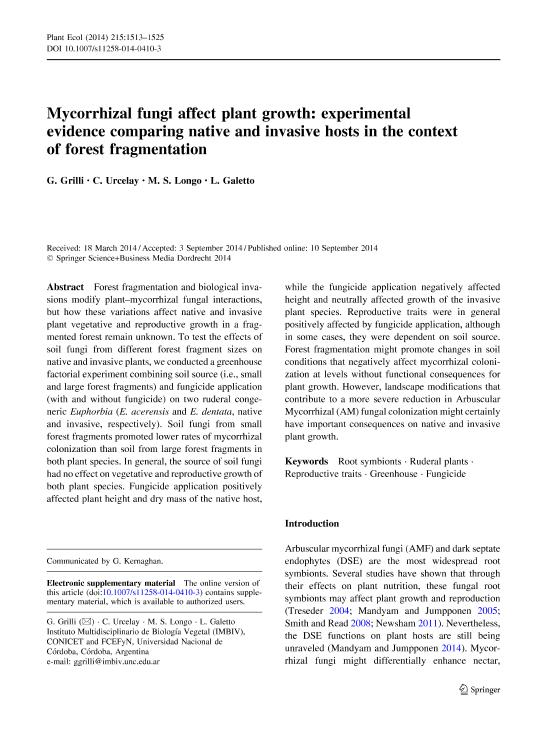Mostrar el registro sencillo del ítem
dc.contributor.author
Grilli, Gabriel

dc.contributor.author
Urcelay, Roberto Carlos

dc.contributor.author
Longo, Maria Silvana

dc.contributor.author
Galetto, Leonardo

dc.date.available
2017-08-16T19:18:24Z
dc.date.issued
2014-09
dc.identifier.citation
Grilli, Gabriel; Urcelay, Roberto Carlos; Longo, Maria Silvana; Galetto, Leonardo; Mycorrhizal fungi affect plant growth: experimental evidence comparing native and invasive hosts in the context of forest fragmentation; Springer; Plant Ecology; 215; 12; 9-2014; 1513-1525
dc.identifier.issn
1385-0237
dc.identifier.uri
http://hdl.handle.net/11336/22539
dc.description.abstract
Forest fragmentation and biological invasions modify plant–mycorrhizal fungal interactions, but how these variations affect native and invasive plant vegetative and reproductive growth in a fragmented forest remain unknown. To test the effects of soil fungi from different forest fragment sizes on native and invasive plants, we conducted a greenhouse factorial experiment combining soil source (i.e., small and large forest fragments) and fungicide application (with and without fungicide) on two ruderal congeneric Euphorbia (E. acerensis and E. dentata, native and invasive, respectively). Soil fungi from small forest fragments promoted lower rates of mycorrhizal colonization than soil from large forest fragments in both plant species. In general, the source of soil fungi had no effect on vegetative and reproductive growth of both plant species. Fungicide application positively affected plant height and dry mass of the native host, while the fungicide application negatively affected height and neutrally affected growth of the invasive plant species. Reproductive traits were in general positively affected by fungicide application, although in some cases, they were dependent on soil source. Forest fragmentation might promote changes in soil conditions that negatively affect mycorrhizal colonization at levels without functional consequences for plant growth. However, landscape modifications that contribute to a more severe reduction in Arbuscular Mycorrhizal (AM) fungal colonization might certainly have important consequences on native and invasive plant growth.
dc.format
application/pdf
dc.language.iso
eng
dc.publisher
Springer

dc.rights
info:eu-repo/semantics/openAccess
dc.rights.uri
https://creativecommons.org/licenses/by-nc-sa/2.5/ar/
dc.subject
Root Symbionts
dc.subject
Ruderal Plants
dc.subject
Reproductive Traits
dc.subject
Greenhouse
dc.subject.classification
Bioquímica y Biología Molecular

dc.subject.classification
Ciencias Biológicas

dc.subject.classification
CIENCIAS NATURALES Y EXACTAS

dc.subject.classification
Bioquímica y Biología Molecular

dc.subject.classification
Ciencias Biológicas

dc.subject.classification
CIENCIAS NATURALES Y EXACTAS

dc.title
Mycorrhizal fungi affect plant growth: experimental evidence comparing native and invasive hosts in the context of forest fragmentation
dc.type
info:eu-repo/semantics/article
dc.type
info:ar-repo/semantics/artículo
dc.type
info:eu-repo/semantics/publishedVersion
dc.date.updated
2017-08-01T13:59:01Z
dc.identifier.eissn
1573-5052
dc.journal.volume
215
dc.journal.number
12
dc.journal.pagination
1513-1525
dc.journal.pais
Alemania

dc.journal.ciudad
Berlin
dc.description.fil
Fil: Grilli, Gabriel. Consejo Nacional de Investigaciones Científicas y Técnicas. Centro Científico Tecnológico Conicet - Córdoba. Instituto Multidisciplinario de Biología Vegetal. Universidad Nacional de Córdoba. Facultad de Ciencias Exactas Físicas y Naturales. Instituto Multidisciplinario de Biología Vegetal; Argentina
dc.description.fil
Fil: Urcelay, Roberto Carlos. Consejo Nacional de Investigaciones Científicas y Técnicas. Centro Científico Tecnológico Conicet - Córdoba. Instituto Multidisciplinario de Biología Vegetal. Universidad Nacional de Córdoba. Facultad de Ciencias Exactas Físicas y Naturales. Instituto Multidisciplinario de Biología Vegetal; Argentina
dc.description.fil
Fil: Longo, Maria Silvana. Consejo Nacional de Investigaciones Científicas y Técnicas. Centro Científico Tecnológico Conicet - Córdoba. Instituto Multidisciplinario de Biología Vegetal. Universidad Nacional de Córdoba. Facultad de Ciencias Exactas Físicas y Naturales. Instituto Multidisciplinario de Biología Vegetal; Argentina
dc.description.fil
Fil: Galetto, Leonardo. Consejo Nacional de Investigaciones Científicas y Técnicas. Centro Científico Tecnológico Conicet - Córdoba. Instituto Multidisciplinario de Biología Vegetal. Universidad Nacional de Córdoba. Facultad de Ciencias Exactas Físicas y Naturales. Instituto Multidisciplinario de Biología Vegetal; Argentina
dc.journal.title
Plant Ecology

dc.relation.alternativeid
info:eu-repo/semantics/altIdentifier/url/https://link.springer.com/article/10.1007%2Fs11258-014-0410-3
dc.relation.alternativeid
info:eu-repo/semantics/altIdentifier/doi/http://dx.doi.org/ 10.1007/s11258-014-0410-3
Archivos asociados
